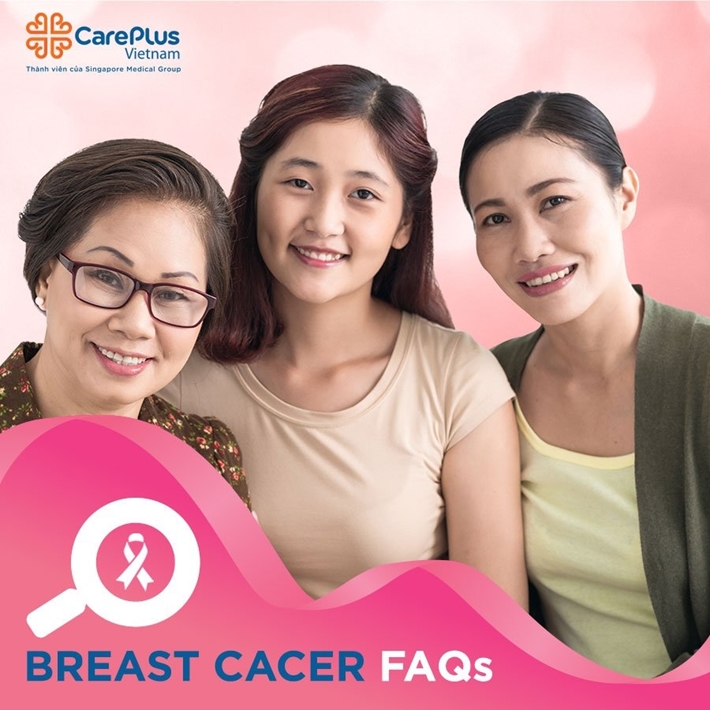Breast Cancer FAQs

6/17/2021 2:24:15 PM
Are only people whose grandmothers, mothers, sisters, and breast cancer are at risk of getting the disease?
Heredity accounts for 5-7% of breast cancers, but not all. The disease can be caused by other causes such as a living environment contaminated with radioactive rays, overweight, weak immune system. However, if your maternal family history of breast cancer, you are classified as a high-risk group.
1. What foods should not be eaten with breast cancer? Does having breast cancer mean not eating soy products?
Previous studies have shown that soy and soy foods contain isoflavones, estrogen-like substances that can promote breast cancer. But isoflavones also have anti-cancer and cardiovascular benefits. The most recent study (2011) showed that soy and soy-based foods are good for patients after breast cancer treatment, predominantly Asian patients like us.
Many studies show that a moderate amount of soy per day does not increase the risk of breast cancer. You can safely drink soy milk and eat tofu if you like. However, it is not recommended to use supplements containing soy or isoflavones because their content is often too high in these foods. And there are many more studies on this issue with no clear conclusions.
2. What is the rate of inheritance of breast cancer from mother to child?
About 30% of women with breast cancer have at least one family member with previous breast cancer, such as a mother, aunt, or sister. You are twice as likely to get breast cancer if your mother also had breast cancer. The more people in your family have breast cancer, the higher your risk. Women with an inherited gene mutation, such as BRCA1-BRCA2, have a 50-80% increased breast and ovarian cancer risk.
3. Is breast cancer contagious?
Cancer is not a contagious disease that spreads quickly from person to person. The only situation in which cancer can spread from one person to another is when the transplant recipient receives cancerous tissue from the donor. However, this risk is shallow.
4. Does use hair dye increase the risk of cancer?
There is no scientific evidence that using hair dye increases the risk of cancer. However, some studies conclude that hairdressers and barbers are regularly exposed to large amounts of hair dyes and other chemical products that may increase the risk of bladder cancer.
5. Antiperspirants, deodorants cause breast cancer?
Without studies, no evidence linking chemicals commonly found in antiperspirants and deodorants to changes in breast tissue.
6. Does keeping your phone next to you while you sleep increase your risk of cancer?
Genetic mutations cause cancer, and cell phones emit low-frequency energy that does not damage the genetic structure.
7. Does just having a mastectomy prevent breast cancer?
Removal of breast cancer is a matter of concern, especially in women at high risk of breast cancer (called preventive mastectomy). Is mastectomy safe for people without breast cancer? And does it improve survival in women who have had unilateral breast cancer before? The answer will depend on the individual's situation.
Bilateral mastectomy is only beneficial in some women with a high risk of breast cancer, such as genetic mutations, but postoperative sequelae are also an issue to consider. Many studies show that 10% of women feel regret after surgery, lose confidence in femininity, and sexual problems occur in about 20-30%. Postoperative pain accounts for about 40% and can affect daily activities.
Furthermore, residual mastectomy after breast cancer treatment does not increase survival because of pre-existing contralateral breast disease. It only reduces the risk of breast cancer in the removed breast. In addition, skin-saving mastectomy in breast reconstruction surgery still leaves a 5-8% risk of breast cancer in the remaining breast skin.
8. Can breast cancer come back after being cured?
Breast cancer can recur at any time, but most recurrences occur in the first five years after treatment. Breast cancer can recur locally (that is, in the treated breast or near the mastectomy scar) or elsewhere in the body called metastasis. Some of the most common sites of metastasis outside the breast are the lymph nodes, bones, liver, lungs, and brain. Therefore, even if you have successfully treated breast cancer, you still need regular breast cancer screening as prescribed by your doctor.
9. Eating many fermented foods such as kimchi, sauerkraut, etc., will you get cancer?
Eating a lot of salty foods increases the risk of stomach and oropharyngeal cancer. In addition, salted and fermented foods increase the risk of colorectal cancer.
10. Can I get pregnant and breastfeeding with breast cancer?
Pregnancy does not increase the risk of recurrence in women with wholly cured breast cancer. There is currently no evidence that breastfeeding after breast cancer treatment increases the risk of recurrence. Some studies even show that breastfeeding reduces the risk of recurrence.
The median time to pregnancy was at least 2 years after completion of treatment. Although it is not clear what the best time is, 2 years is sufficient to monitor for possible early relapses. However, some cases can recur within the first 2 years, so how long after getting pregnant after breast cancer treatment will vary from person to person.
Women taking Tamoxifen for 5 years usually need to take it for at least 2 years before becoming pregnant and use it again after the baby is born.